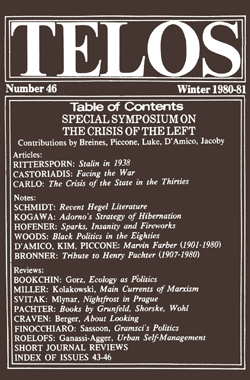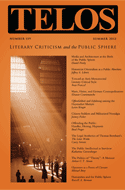Cas Mudde’s book on Syriza’s “failure of populist promises,” which recently appeared in Greek, lends itself to multiple, successive readings of the current Greek populist experience in a comparative setting. One of the leading political scientists currently researching the populist phenomenon in both its radical-right and radical-left varieties, Mudde combines thorough knowledge of his subject matter’s ideological premises with a thorough analysis of his factual material, namely, the empirical cases he sets out to investigate. Indeed, it is to Mudde that we owe the term “pathological normalcy,” denoting the current form of radical-right populism in Europe. Mudde has used this term to explain the phenomenon of “mainstream thought” radicalization employed by the “populist radical right” with a view to exploiting a social and identitarian malaise that is widespread in several European countries. It is also to Mudde that we owe a number of thought-provoking and, in many respects, pioneering comparative studies (many of them co-authored or co-edited with his fellow political scientist Cristόbal Rovira Kaltwasser) about the differences between European and Latin-American populisms, in which Mudde demonstrates the latter’s rather inclusionary practices as opposed to the former’s rather exclusionary ones. Moreover, we owe him a very insightful discussion of the different outcomes produced when populist political parties come to power.
|
In today’s public life, marked by large-scale migration, welfare states under pressure, and a soaring right-wing scene, “multiculturalism” and “right-wing populism” remain at the center of political debate. It is assumed, moreover, that they stand in sharp opposition to one another. On the one hand, multiculturalism is widely acclaimed for being progressive, radical, and safely leftist. It is seen as a vital precondition for a modern society: tolerant, humble, and anti-racist. Anyone who opposes multiculturalism, then, will be deemed at best a conservative or reactionary—if not outright racist, xenophobe, nationalist, or fascist. On the other hand, we have right-wing populism. Due to its allegiance with racism, virulent nationalism, and fascism, right-wing populism has a dubious reputation. Multiculturalism, as it seems, is anything that right-wing populism is not.
Castoriadis’s analysis here is an updated version of the assessment of Russian society that had been developed within Socialisme ou Barbarie. Castoriadis makes a compelling argument that Russia had regenerated itself into a full-blown stratocracy, armed to the teeth and yet still unable to provide its citizens with a functional civic bureaucracy; a decade later he reflects that a core argument of “Facing the War” was that brute force had become the sole signification holding this society together. Castoriadis’s argument operates at two levels: as a political analysis of Russian bureaucratic spheres (the comparison of military capacity between superpowers and a critique of rational determinism within the justification of Cold War strategy—i.e., M.A.D.); and as a political judgement of the imaginary significations that served to orient Russian society. It is through the latter level that lessons on historical contingency are astutely relevant to the contemporary world situation. Eleanor Courtemanche’s “Marx, Heine, and German Cosmopolitanism: The 1844 Deutsch-Französische Jahrbücher” appears in Telos 159 (Summer 2012). Read the full version online at the Telos Online website, or purchase a print copy of the issue here. |
||||
|
Telos Press Publishing · PO Box 811 · Candor, NY 13743 · Phone: 212-228-6479 Privacy Policy · Data Protection Copyright © 2025 Telos Press Publishing · All Rights Reserved |
||||
 “Facing the War” is a translation from the first section of Devant la guerre, Cornelius Castoriadis’s least regarded work within English-speaking circles. The reason for this marginalization is its central claim that Russian society had transformed into a stratocratic regime, with increased probability for an escalation into a Third World War. Castoriadis’s critics claimed he had missed signs of perestroika and glasnost already on the horizon. Viewed from this perspective, history could not have been more cruel to Castoriadis. However, the value of his work does not depend on a predictive mode of political analysis, a point that is clearly prefaced in this work: calls for predictive accuracy ignore the radical character of historical contingency. In fact, the unexpected events put into motion later by Gorbachev only strengthen Castoriadis’s perspective in the sense that such a development represents the deeper problem of historical indeterminacy, and it is in this respect that his analysis is finely tuned to any society’s condition of historical contingency.
“Facing the War” is a translation from the first section of Devant la guerre, Cornelius Castoriadis’s least regarded work within English-speaking circles. The reason for this marginalization is its central claim that Russian society had transformed into a stratocratic regime, with increased probability for an escalation into a Third World War. Castoriadis’s critics claimed he had missed signs of perestroika and glasnost already on the horizon. Viewed from this perspective, history could not have been more cruel to Castoriadis. However, the value of his work does not depend on a predictive mode of political analysis, a point that is clearly prefaced in this work: calls for predictive accuracy ignore the radical character of historical contingency. In fact, the unexpected events put into motion later by Gorbachev only strengthen Castoriadis’s perspective in the sense that such a development represents the deeper problem of historical indeterminacy, and it is in this respect that his analysis is finely tuned to any society’s condition of historical contingency.  This article argues that Marx’s economic cosmopolitanism was formulated, in part, as a response to the exiled radical poet Heinrich Heine’s satirical attacks on German nationalism. In Paris in 1844, the young journalist Marx collaborated with the revered Heine on the Deutsch-Französische Jahrbücher, which was meant to join German metaphysics and poetry with French socialist politics. Like Heine, Marx was a secular Jew from the border region of the Rhineland who saw French revolutionary politics as Germany’s inevitable destiny. While Heine wrestles with nostalgia for a backwards Prussia in Deutschland: Ein Wintermärchen (published in Vorwärts! in 1844), Marx’s “Critique of Hegel’s Philosophy of Law” argues that Germany must accomplish a difficult backwards somersault (“salto mortale“) over the dialectical boundary of the Rhine to transcend the impasses of French politics and British industrialism. Both Heine and Marx transformed their critique of Prussian autocracy into a more generalized cosmopolitan radicalism, though Heine’s aestheticism is sometimes confounding to Marxist critics. Meanwhile Marx’s engagement with the German tradition of Nationalökonomie is complex: while he critiques the Prussian nationalist use of free trade theories, the internationalism of his economic vision brings him closer to the British classical tradition of Smith and Ricardo than to German romantic protectionists like Friedrich List.
This article argues that Marx’s economic cosmopolitanism was formulated, in part, as a response to the exiled radical poet Heinrich Heine’s satirical attacks on German nationalism. In Paris in 1844, the young journalist Marx collaborated with the revered Heine on the Deutsch-Französische Jahrbücher, which was meant to join German metaphysics and poetry with French socialist politics. Like Heine, Marx was a secular Jew from the border region of the Rhineland who saw French revolutionary politics as Germany’s inevitable destiny. While Heine wrestles with nostalgia for a backwards Prussia in Deutschland: Ein Wintermärchen (published in Vorwärts! in 1844), Marx’s “Critique of Hegel’s Philosophy of Law” argues that Germany must accomplish a difficult backwards somersault (“salto mortale“) over the dialectical boundary of the Rhine to transcend the impasses of French politics and British industrialism. Both Heine and Marx transformed their critique of Prussian autocracy into a more generalized cosmopolitan radicalism, though Heine’s aestheticism is sometimes confounding to Marxist critics. Meanwhile Marx’s engagement with the German tradition of Nationalökonomie is complex: while he critiques the Prussian nationalist use of free trade theories, the internationalism of his economic vision brings him closer to the British classical tradition of Smith and Ricardo than to German romantic protectionists like Friedrich List. 

